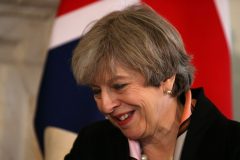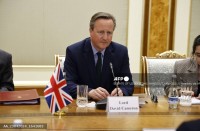
by Alice Ritchie
Agence France Presse
LONDON, United Kingdom (AFP) — Britain’s main opposition Labour Party defeated UKIP’s leader in a Brexit bastion, but in a second by-election suffered a landmark defeat to Prime Minister Theresa May’s governing Conservatives on Friday.
The results saw the Brexit-championing UK Independence Party fail to capitalise on the June referendum vote to leave the European Union. But while Labour celebrated fending off UKIP’s bid to replace them in their traditional post-industrial heartlands, the historic loss elsewhere of a seat to the Conservatives was a big blow to their prospects in the 2020 general election.
In Thursday’s two parliamentary by-elections, Labour clung on to its Stoke-on-Trent Central seat, in the British city that registered the highest vote for leaving the EU. Labour’s Gareth Snell took 37 percent of the vote, beating new UKIP leader Paul Nuttall who garnered 25 percent. In a town where voter apathy runs deep, turnout stood at 38 percent.
Both parties had ploughed huge resources into the contest in west central England, which had been pitched as make-or-break for both sides.
Nuttall insisted the defeat did not mark the end of UKIP.
“This seat was 72 on our target list. There’s a lot more to come from us,” he said.
“There are other issues beyond Brexit.”
But Labour’s relief at retaining Stoke-on-Trent Central could not mask the impact of their loss of the rural seat of Copeland on the northwest English coast.
– Historic swing to Conservatives
Conservative Trudy Harrison hailed a “truly historic event” after winning the by-election with 44 percent to 37 percent for Labour’s Gillian Troughton. It was the first time a governing party has taken an opposition-held seat in a by-election since 1982.
Many jobs in the constituency depend on the Sellafield nuclear processing facility, and veteran leftist Labour leader Jeremy Corbyn’s strong antinuclear stance may have damaged the party’s fortunes. “Labour’s victory in Stoke is a decisive rejection of UKIP’s politics,” Corbyn wrote on Twitter.
“But our message was not enough to win through in Copeland. “To win power to rebuild and transform Britain, Labour will go further to reconnect with voters and break with the failed political consensus.”
Labour is deeply divided on Corbyn’s leadership and on accepting Brexit, which was strongly supported in its heartlands but was opposed by its MPs.
Nationwide opinion polls keep May’s center-right Conservatives 18 points ahead and bookmakers lengthened the odds on Labour winning the 2020 general election after the Copeland defeat.
Simon Usherwood, a politics reader at the University of Surrey, told AFP the results showed Labour was in a “bad place”.
– ‘Great moment for May’
“For UKIP, it’s not the end of the party; it looks like a missed opportunity,” he said. “It shows that support for Brexit doesn’t automatically translate in support for UKIP. “This is a great moment for Theresa May,” he added.
“Her two main challenging parties have both suffered setbacks, their party leaders look compromised, she got another MP to increase her majority and she didn’t have to get her hands dirty.” The by-election results leave the Conservatives with a working majority of 16 in parliament’s 650-seat lower House of Commons.
rjm-jk-bur/hmw
© Agence France-Presse







